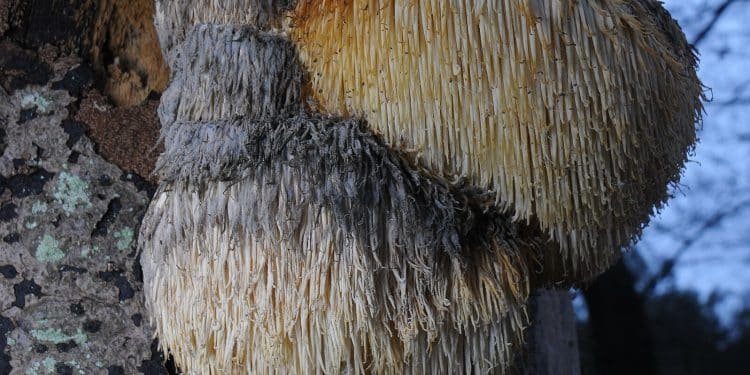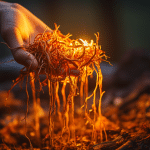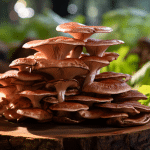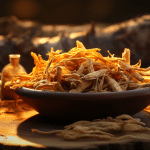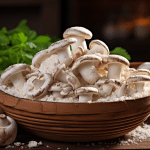Is lion’s mane healthy? Why yes, it is. Lion’s mane has so many health benefits that it’s crazy. That’s why we include it in our recommended supplements list. Hericium erinaceus packs a slew of amazing bioactive compounds that affect everything from neurogenesis to depression. Can the lion’s mane mushroom treat diabetes, beat cancer, and help you achieve God-tier mental abilities? Let’s take a look at what the science says about the many benefits of this bizarre, shaggy fungus.
Intro to Lion’s Mane Mushroom
Lion’s Mane Mushroom, also known as Hericium erinaceus, Bearded Tooth, or Pom-Pom Mushroom, is an edible, adaptogenic mushroom. It is native to Europe, Asia, and North America.
Here is a quick video that we think does a great job at giving an overview of this awesome mushroom:
Where to Find Lion’s Mane Mushrooms
In the wild, the lion’s mane mushroom is more often found on the forest floor in summer and autumn. Lion’s mane typically eats dead trees, making it a saprotroph. However, it may also occur on some live trees, where it lives as a parasite.
If trekking around in the forest is not your speed, then you could cultivate lion’s mane msuhroom on your own. Or, you can purchase lions mane mushrooms online or at local markets that carry them; just do some research into the sellers of lions mane in your town.
Potential Medicinal Properties of Lion’s Mane Mushroom
There is much research into lion’s mane mushrooms medical properties, with the results being very promising. Here is a quick list:
- It seems to be able to protect against symptoms of dementia
- It can aid in weight loss and weight maintenance
- It may reduce inflammation
- Alleviate neuropathic pain
- Has been shown to reduce mild symptoms of depression and anxiety
- In some studies it may increase testosterone levels
- It possesses organic compounds that show cancer-fighting potential
- It seems to promote neural regeneration and overall brain health
- Shows promise for promoting gut health
From a science-based standpoint, there is an incredible amount of potential in these medicinal mushrooms, which needs to be explored further.
Lion’s Mane Mushroom for Brain Health
The benefits of the mushroom for cognitive health are convincing. Importantly, although most of the clinical trials are conducted on lab animals, there are some that have been done on humans, and it appears to have tremendous promise in terms of neurological health and mental function. Studies correlate improved cognitive functions and stronger neural cells with ingestion of lions mane. So, how far does the benefits of mushrooms for enhancing the brain reach?.
It helps in boosting mental clarity, the evidence says yes. Enhancing cognitive functions? There is evidence to support this as well. Lowering anxiety and depression? Again, there is evidence, but everyone’s results may vary. Lion’s mane has been shown to help with regeneration of nerve cells. Last but not least, lion’s mane has been used for alleviating symptoms of ADHD.
Clinical trials have also shown lions mane can benefit advanced diseases like Alzheimers, as well as improving general memory and cognitive health.
Does Lion’s Mane Mushroom Help Protect Against Stroke?
Hericium erinaceus can help prevent strokes, according to a 2015 scientific paper. The mushrooms fruit bodies and mycelia are packed with bioactive compounds which appear to possess cardiovascular protective and antihypertensive properties. In addition to helping to reduce the likelihood of having a stroke, Lions Mane also has protective properties which help with the recovery from stroke. A 2014 study investigated “nerve-growth properties of the lion’s mane mycelium”; specifically, whether lions mane mycelium could protect against ischaemic stroke, and assist with neural regeneration following stroke. The answer appears to be “yes” on both counts.
The findings support that Hericium erinaceus helps to decrease the degree of stroke-induced brain damage, it limits the blood flow to areas of the brain. The study also indicated that Hericium erinaceus mycelium has “nerve-growth properties” that are beneficial in recovering from stroke. It said the nerve-growth properties “also included prevention of neuronal ischemic damage” which occurs in stroke.
What Are The Benefits of Lion’s Mane Mushroom for the Heart?
Platelet accumulation in your blood vessels causes a clot, and this clogs blood vessels, causing problems in your lungs, brain, and limbs. A 2010 study found hericenone B, a compound found in the lions mane, works to reduce platelet aggregation. This indicates that lions mane may be helpful to people who are at a higher risk for thrombosis, blood clots that can block veins and arteries. Hericium erinaceus may also help with fat metabolism.
Researchers fed mane of the lion to mice consuming high-fat diets for 28 days. Without changing their diet, their body fat percentages and levels of triacylglycerol, the kind of fat found in blood, decreased. Another study came to similar conclusions. Lions mane decreased the levels of low-density, bad cholesterol (LDL) and increased the levels of high-density, good cholesterol (HDL) in rats.
Lion’s Mane Prevents Cancer?
Many of the medicinal mushrooms have amazing tumor-fighting properties, including Lions Mane. The cerebrosides found inside the fruit bodies of lions mane may prove especially useful to cancer patients. One study evaluated how Cerebroside E, specifically, might help with cancer treatments.
The compound was shown to slow down new tumor cell growth by suppressing the formation of new blood vessels, which would provide the tumor cells with blood. Hericium erinaceus also contains phytochemicals (bioactive compounds) which could have therapeutic potential for some types of cancer, including leukemia. Lions mane also may possess antimetastatic activities, particularly against metastases from lung cancer. A 2013 study found the mushrooms powerfully induce tumor cell death, suppressing tumor cell metastasis.
Lion’s Mane Mushroom for the Immune System
A study investigated the effects of mane polysaccharides in mice for immune health. Results showed that Hericium erinaceus enhances immune function, increasing both cellular and humoral immunity.
The medicinal mushroom may also help regulate gut microbiome. A 2017 study found that the protein isolated from mane acts as a probiotic, which is good for the overall metabolism. Given the fact that the intestine plays an important role in the immune system, having a healthy gut microbiome is essential to having an optimal immune health.
Another study looked at a potential antibacterial effect of lion’s mane mushroom in mice. The results suggested that extract from the Lions Mane mushrooms triggers the activation of innate immune cells, thereby helping the body to combat bacterial infections.
Lion’s Mane Fights Inflammation
Antioxidant properties and an ability to combat inflammation are some of the many benefits of lion’s mane mushrooms.
A 2014 study found water-soluble oligosaccharides found in the mushroom Hericium erinaceus had amazing antioxidant activities. Another study looked at the capacity of Lions Mane mushrooms to decrease inflammation in mice suffering from acute alcohol poisoning. The mice given the lions mane supplement had substantially less serious liver damage compared with control subjects. Lions mane mushrooms contain polysaccharides, which may reduce oxidative stress. A 2012 study found increased antioxidant enzymes in mice 15 days after eating lions mane.
How to Eat Lion’s Mane Mushroom
I have found it best to eat lion’s mane mushrooms in the morning if you want the cognitive benefits for work or if you have something you’re doing where you want higher cognitive performance. The dose of lions mane mushrooms that you need to take each day will vary depending on the purpose you are taking the mushrooms for.
Fortunately, there are many ways you can incorporate lions mane into your diet. Some of the most common include capsules with lions mane mushrooms, as well as lion’s mane powder or extract.
You can find our favorite capsules, powders, and tincture’s on the following pages of our website and learn more about each individually:
The Best Lion’s Mane Supplements
The Best Lion’s Mane Tinctures
Lion’s Mane Powders
Lion’s mane mushroom powder is one of the most common ways of consuming this mushroom. You can add powder into your smoothie, shake, or just stir into your water. The powdered mushrooms let you reap the full benefits of lion’s mane mushrooms. However, if you are not a fan of lions mane mushrooms earthy flavor, you might find yourself looking for alternate ways of consuming lion’s mane.
Lion’s Mane Mushroom Supplements
You can get Lions Mane Mushroom Supplements in a variety of forms, with Mushroom Capsules being the most popular option. You can take a lions mane capsule in the morning along with your daily vitamins, and get all-day benefits from the mushrooms. However, this option might not be a good option for you if you frequently forget to take the supplements.
Cooking Lion’s Mane Mushrooms in Recipes
If mushrooms are your thing, give some of these mushroom recipes a shot for yourself. There are a lot of options for lion’s mane mushroom recipes, so you can experiment until you find something that appeals to you.
Lion’s Mane Tea
You can either prepare lion’s mane tea from powdered supplements, or purchase pre-made tea blends. If using the powder, put one cup of boiling water on top of one teaspoon and allow to steep for about 10 minutes. Alternatively, if using a pre-made blend, follow the instructions provided by the manufacturer.
Additional Resources:
What Does Lion’s Mane Mushroom Taste Like?
Update 10/10/2022
